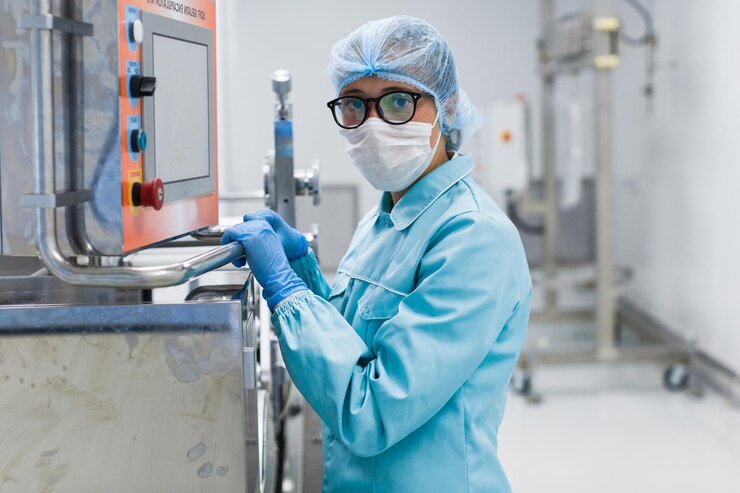In the healthcare industry, numerous roles work behind the scenes to ensure the safety and effectiveness of patient care. One such critical role is that of a sterile processing technician. Often overlooked, sterile processing technicians are essential to the smooth operation of healthcare facilities, playing a crucial part in infection control and patient safety. If you’re considering a career in healthcare that combines technical skills with the satisfaction of making a difference, a job as a sterile processing technician might be the perfect fit. This article explores what it takes to become a sterile processing technician, the job outlook, and why this career is so vital in the healthcare field.
What is a Sterile Processing Technician?
A sterile processing technician, also known as a central service technician, is responsible for cleaning, sterilizing, and preparing surgical instruments and medical equipment. These technicians work in hospitals, surgery centers, dental offices, and other healthcare facilities, ensuring that all tools are free from contaminants and safe for use in patient care.
The role requires a high level of attention to detail and a thorough understanding of sterilization techniques, as even the smallest mistake can lead to infection or complications during medical procedures. Sterile processing technicians are the unsung heroes who ensure that every instrument used in surgeries and other medical procedures is properly cleaned and sterilized, thereby safeguarding patient health.
Key Responsibilities of a Sterile Processing Technician
Sterile processing technicians have a variety of responsibilities that are crucial to the daily operations of healthcare facilities. Here are some of the key duties involved in the role:
- Cleaning and Decontaminating Instruments: After surgical procedures, all instruments must be thoroughly cleaned and decontaminated. Sterile processing technicians use specialized cleaning agents and equipment to remove blood, tissue, and other contaminants from surgical tools.
- Sterilizing Instruments: Once cleaned, instruments are placed in sterilization machines, such as autoclaves, to eliminate any remaining bacteria, viruses, or other pathogens. Sterile processing technicians must understand and follow strict protocols to ensure that all equipment meets sterilization standards.
- Inspecting and Assembling Instruments: Technicians carefully inspect instruments for damage or wear and tear. They also assemble surgical trays and instrument sets, ensuring that all necessary tools are available for upcoming procedures.
- Packaging and Labeling: Sterile processing technicians package sterilized instruments and label them with essential information, such as the date of sterilization and the contents of the package. This process is critical for maintaining the sterility of instruments until they are needed.
- Maintaining Records: Technicians are responsible for documenting all sterilization processes, including the methods used and the results of biological tests. These records are essential for compliance with healthcare regulations and for tracking the effectiveness of sterilization procedures.
- Managing Inventory: In addition to processing instruments, sterile processing technicians also manage the inventory of sterile supplies. This includes ordering new instruments, ensuring that enough sterile items are available for procedures, and tracking the usage of supplies.
The Importance of Sterile Processing Technicians in Healthcare
Sterile processing technicians play a vital role in preventing infections and ensuring the safety of both patients and healthcare providers. The importance of this role cannot be overstated, as improperly sterilized instruments can lead to serious health complications, including surgical site infections, the spread of hospital-acquired infections, and other adverse outcomes.
In a time when infection control is more critical than ever, the demand for skilled sterile processing technicians is on the rise. These professionals are a key part of the healthcare team, working behind the scenes to support surgeons, nurses, and other medical staff in delivering safe and effective care.
Qualifications and Training for Sterile Processing Technician Jobs
To become a sterile processing technician, you need a combination of education, training, and certification. Here’s what you need to know about the qualifications required for this career:
- Educational Requirements: Most sterile processing technician jobs require a high school diploma or equivalent. Some employers may prefer candidates with post-secondary education in healthcare or a related field, but this is not always necessary.
- Training Programs: Many aspiring sterile processing technicians enroll in specialized training programs that provide both classroom instruction and hands-on experience. These programs typically cover topics such as microbiology, infection control, sterilization techniques, and the proper handling of surgical instruments.
- Certification: While certification is not always required, it is highly recommended and can significantly improve job prospects. The Certified Registered Central Service Technician (CRCST) credential, offered by the International Association of Healthcare Central Service Materiel Management (IAHCSMM), is one of the most recognized certifications in the field. To earn this certification, candidates must pass an exam and complete a specified number of hours in a sterile processing role.
- On-the-Job Training: Many sterile processing technicians receive additional training on the job, particularly when starting at a new facility. This training ensures that they are familiar with the specific protocols and equipment used by their employer.
Job Outlook and Career Advancement
The demand for sterile processing technicians is expected to grow steadily in the coming years, driven by an aging population and the ongoing need for surgical procedures. According to the U.S. Bureau of Labor Statistics, employment for medical equipment preparers, which includes sterile processing technicians, is projected to grow faster than the average for all occupations.
For those interested in career advancement, there are opportunities to move into supervisory or managerial roles within the sterile processing department. Technicians who gain experience and additional certifications may also transition into other healthcare roles, such as surgical technologists or infection control specialists.
Challenges and Rewards of Working as a Sterile Processing Technician
Like any healthcare profession, working as a sterile processing technician comes with its challenges. The job requires meticulous attention to detail, the ability to work under pressure, and a strong commitment to following strict protocols. Technicians must also be prepared to handle repetitive tasks and work in a fast-paced environment where the stakes are high.
However, the rewards of the job are significant. Sterile processing technicians play a critical role in patient safety, making a direct impact on the quality of care provided in healthcare facilities. For those who take pride in precision and want to contribute to the well-being of others, this career offers a sense of fulfillment and purpose.
FAQs
What does a sterile processing technician do?
A sterile processing technician is responsible for cleaning, sterilizing, and preparing surgical instruments and medical equipment to ensure they are safe for use in patient care.
What qualifications do I need to become a sterile processing technician?
Most sterile processing technician jobs require a high school diploma or equivalent, completion of a training program, and certification such as the CRCST (Certified Registered Central Service Technician).
Is certification required to work as a sterile processing technician?
While certification is not always required, it is highly recommended and can improve job prospects. Certification like CRCST demonstrates expertise in sterilization and infection control.
What is the job outlook for sterile processing technicians?
The job outlook for sterile processing technicians is positive, with demand expected to grow due to the aging population and the ongoing need for surgical procedures.
What are the main responsibilities of a sterile processing technician?
Sterile processing technicians are responsible for cleaning, sterilizing, inspecting, assembling, packaging, and labeling surgical instruments and medical equipment.
Can a sterile processing technician advance their career?
Yes, with experience and additional certifications, sterile processing technicians can advance to supervisory roles or transition into other healthcare careers, such as surgical technologists or infection control specialists.
Conclusion
Sterile processing technician jobs are an essential part of the healthcare system, ensuring that medical instruments are clean, sterile, and ready for use in patient care. This career offers a unique blend of technical skills and the satisfaction of knowing that your work directly contributes to patient safety. With strong job prospects, opportunities for advancement, and the chance to make a meaningful impact, a career as a sterile processing technician is both rewarding and vital in today’s healthcare environment.











